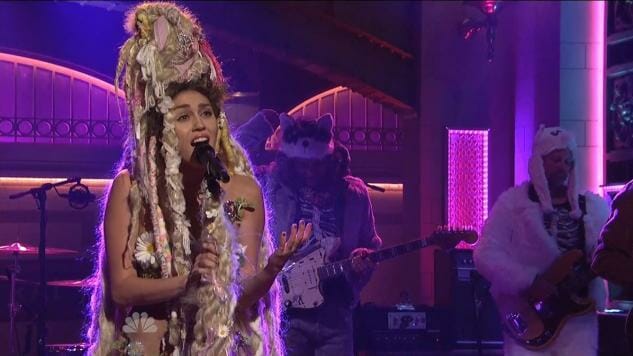Saturday Night Live: “Miley Cyrus” (41.01)

There is nothing very remarkable about Miley Cyrus. Her voice is strong, her sitcom acting skills serviceable. But the same could be said of thousands of young women struggling to make it in show business. Miley Cyrus is “Miley Cyrus” because she is the daughter of a briefly famous singer from a couple of decades ago. And you can hear it in her songs, see it her demi-outrageous fashion reveals. Her corny dad jokes about smoking weed and sex—it’s almost heartbreaking: Come on y’all, this is all I got. Can I still be famous?
The same can be said for Saturday Night Live, particularly in the first episode of its 41st season.
SNL41 arrives like a mid-season misfire rerun from last season. The most fascinating thing about it is how little it’s changed. Over the summer, no cast member left the show, and only one was added (SNL has developed such an affinity for benignly handsome white guys. Godspeed Jon Rudnitsky!). It’s unclear if any changes have taken place in the writing staff, but Season 41 material unfolds at precisely the same imaginative pace as last season. Limp, uninspired. Even Beck Bennett and Kyle Mooney’s pre-tape 10-to-1, “Miley Wedding,” feels hackneyed.
The “news” will be abuzz with SNL41’s decision to pit Kate McKinnon’s Hillary Clinton against Hillary Clinton’s “Val the Bartender” in the sketch, “Bar Talk.” In it, Hillary Clinton (McKinnon) walks into a bar and proceeds to drown her political sorrows…that is until a street-smart bartender (Clinton) talks some sense back in to her. The piece is cute. Hillary read her cue cards like a pro, and seemed like she was having fun…even when Darrell Hammond appeared as Bill and winced at the sight of two of her. For a Hillary supporter it was, no doubt, comforting to see. Which is precisely why this approach to political engagement is so bad for Saturday Night Live.
This idea of parodists and satirists colluding with the objects of their ridicule is a relatively new one, borne of a remarkable sociological shift. There was a time when broadcast comedy could be used to hold powerful people in check—it even happened on SNL. But statesmen and politicians are entertainers now. Entertainers and comedians are statesmen. Both are highly compensated for their work, endowed by their creator with inalienable celebrity, and both rise solely on their ability to make us feel something. The ones who make us the angriest, the happiest, the most helpless, the most powerful…these are the ones we champion. There is no controversy in SNL’s “Bar Talk,” no pointed satire, and only the most banal parody. Several years ago, Sarah Palin appeared on Saturday Night Live opposite Tina Fey and it felt the same: a point had been blunted.
If all the people on TV, the actors and the politicians, really do come out of the same green room, if they share makeup artists and hairstylists and wardrobe people—if their friends get to help write the comedy scripts—how do any of us know what we know? How can we choose? If it’s all a TV show, why choose at all?